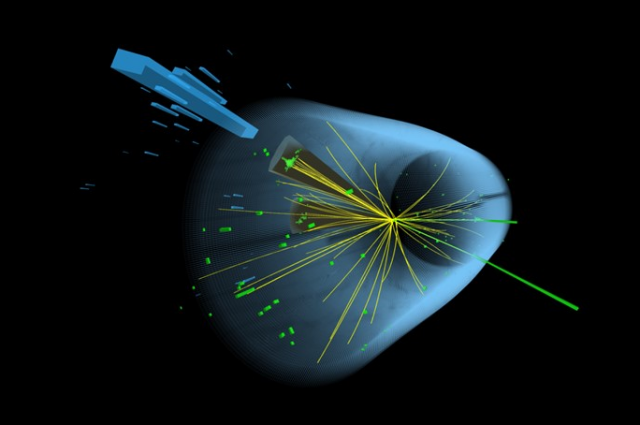
The Higgs Boson often referred to as the "God Particle," is a subatomic particle that plays a crucial role in the fundamental nature of the universe. The discovery of the Higgs Boson was a groundbreaking achievement in the field of particle physics, confirming the existence of a fundamental particle that gives mass to all other particles in the universe.
Particle physics is the branch of physics that studies the fundamental building blocks of matter and the forces that govern their interactions. It deals with the study of subatomic particles (such as protons, neutrons, electrons, and neutrinos), which are particles that are smaller than atoms, and their interactions with each other.
The Standard Model of Particle Physics
The Standard Model of Particle Physics is a theoretical framework that describes the fundamental building blocks of the universe and the forces that govern their interactions. The model consists of twelve fundamental particles and their corresponding antiparticles, divided into two categories: fermions and bosons. The matter is composed of fermions, which are the fundamental building blocks, whereas bosons are responsible for mediating the fundamental forces between particles.
The Higgs Boson is a fundamental particle in the Standard Model that was proposed by a British theoretical physicist, Peter Higgs in 1964. According to the model, particles acquire mass by interacting with a field known as the Higgs field, an invisible kind of force field that pervades the whole Universe. Higgs field is all around us, everywhere in the Universe. It gives mass to the elementary particles. (Elementary or fundamental particles are subatomic particles that are not made up of smaller particles. They are the most basic building blocks of matter and are considered to be indivisible). The Higgs Boson is the particle associated with this field, and its discovery confirmed the existence of this crucial component of the Standard Model.
The Discovery of the Higgs Boson Particle
The search for the Higgs Boson began in the 1960s when physicists first proposed the existence of the particle. It was not until the construction of the Large Hadron Collider (LHC) at CERN, the European Council for Nuclear Research, that scientists were able to conduct experiments that could potentially discover the Higgs Boson (named after Peter Higgs).
CERN is primarily focused on conducting research in the field of particle physics, and operates the European Laboratory for Particle Physics, which is situated in the vicinity of Geneva, Switzerland. The laboratory is dedicated to studying the fundamental properties and behaviour of subatomic particles, with the ultimate goal of understanding the forces that govern their interactions.
In 2012, after decades of research and experimentation, scientists at CERN announced that they had discovered a particle consistent with the Higgs Boson. The discovery was confirmed through a series of experiments conducted at the LHC, which involved smashing protons together at incredibly high speeds and measuring the resulting particles. The recognition of this discovery resulted in the awarding of the Nobel Prize in Physics in 2013.
Properties and Characteristics of the Higgs Boson
The Higgs Boson is a subatomic particle with a mass of approximately 125 gigaelectronvolts (GeV). It is an elementary particle, which means it has no substructure and cannot be broken down into smaller components. The Higgs Boson has a unique interaction with the Higgs field, which gives it its mass and determines its properties.
One of the most important properties of the Higgs Boson is its decay pattern. The particle decays into other particles very quickly, making it difficult to observe directly. Scientists must instead study the particles that the Higgs Boson decays into to confirm their existence and properties.
Significance of the God particle
The discovery of the Higgs Boson has significant implications for our understanding of the universe. It confirms the existence of the Higgs field, which is responsible for giving mass to all other particles in the universe. Without the Higgs field, particles would have no mass, and the universe as we know it would not exist. If there is no Higgs field, the world wouldn’t exist at all. In the absence of it, there would be a complete lack of stars, planets, atmosphere, and essentially, all forms of matter.
The discovery of the Higgs Boson also has implications for the search for new physics beyond the Standard Model. While the Standard Model has been incredibly successful in describing the fundamental building blocks of the universe, it has limitations and is not a complete theory of everything. The discovery of the Higgs Boson provides a valuable tool for studying and understanding the underlying physics that govern our universe.
The discovery of the Higgs Boson has also opened up new frontiers in the study of particle physics. Scientists are now able to explore new areas of research that were previously thought to be impossible. The scope of this research encompasses the exploration of dark matter, which is believed to comprise approximately 27% of the matter present in the universe (with dark energy accounting for 68% and ordinary matter comprising the remaining 5%). This could help to shed light on one of the greatest mysteries in physics and may lead to new discoveries that could revolutionize our understanding of the universe. Dark matter is a type of matter that is believed to make up a significant portion of the total matter in the universe. It does not interact with light or any other form of electromagnetic radiation, so it cannot be seen directly, which is why it is called "dark."
One area of research that is currently being explored is the study of antimatter. Antimatter is the opposite of matter and is thought to be present in the universe in small quantities. By studying the properties of antimatter, scientists hope to gain a better understanding of the universe and its origins.
Overall, the future research and development of the God particle hold great promise for our understanding of the universe and our ability to harness its potential for the benefit of humanity.
